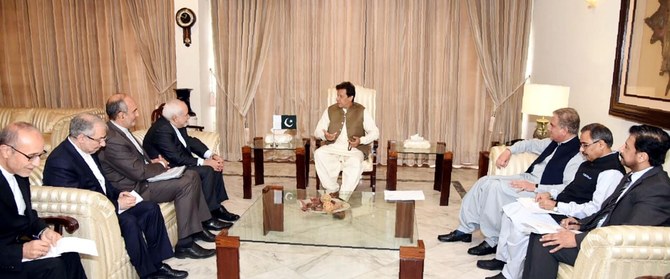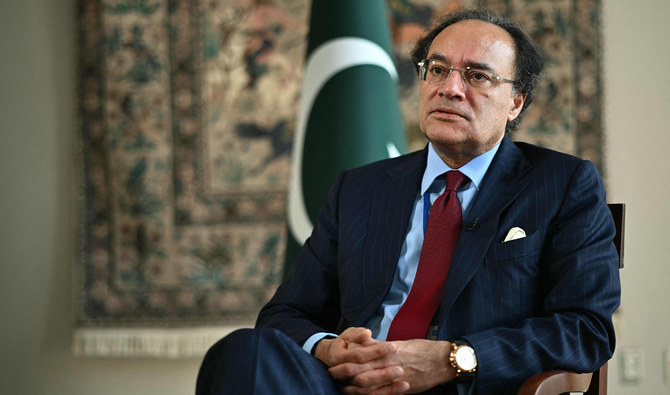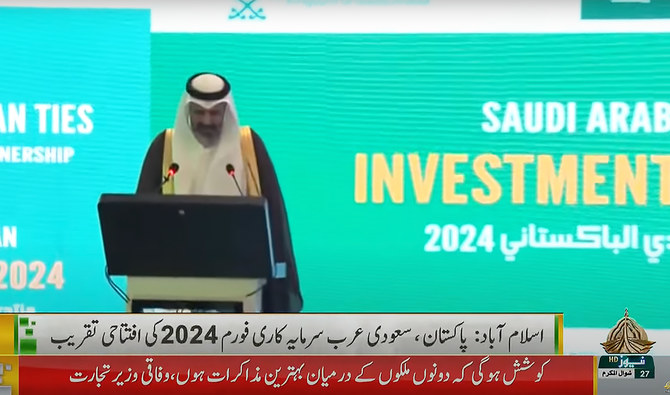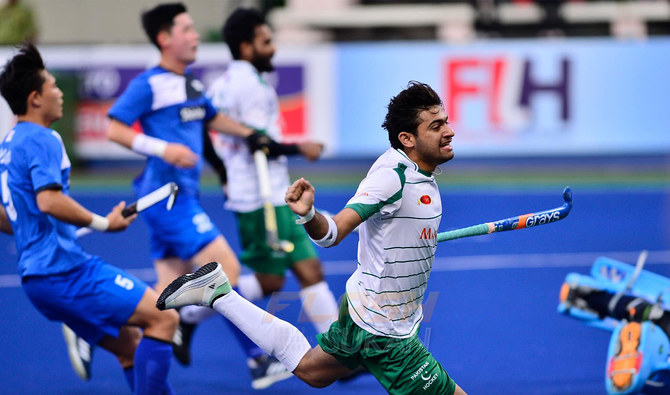ISLAMABAD: Pakistani Foreign Minister Shah Mahmood Qureshi on Friday assured his visiting Iranian counterpart that Islamabad would continue its efforts to ensure peace in the region, the foreign office said, as Mohammad Javad Zarif arrived in Pakistan to seek mediation amid heightened tensions between the Islamic Republic and the United States.
Zarif started a two-day visit to Islamabad on Thursday night, ahead of next week’s emergency Arab League meeting summoned by Saudi Arabia over escalating tensions in the Arabian Gulf region. The Pakistani foreign office officials said the purpose of the visit — which has not been publicly revealed other than to say Zarif will hold bilateral talks with Pakistani leaders — was to seek Islamabad’s help in deescalating mounting tensions with the US.
“Pakistan supports diplomatic engagement to resolve all outstanding issues, and all stakeholders need to demonstrate restraint and patience,” Qureshi told Zarif during delegation level talks at the Foreign Office.
According to an official handout circulated by Pakistan’s foreign ministry later in the day, the two sides also discussed how to increase bilateral trade, facilitate people to people contacts, open new border markets and crossing points, and enhance security in their frontier regions.
Qureshi described Iran’s nuclear deal with six major world powers as “a good example of negotiated settlement of complex issues through diplomatic means,” adding that his country supported it and thought that all signatories to the deal must live up to their obligations.
The United States pulled out of the agreement a year ago that limited Iran’s nuclear program in return for lifting economic sanctions. This month tensions have risen sharply following US President Donald Trump’s decision to try to cut Iran’s oil exports to zero and beef up US military presence in the Gulf in response to what he says are Iranian threats.
“Tensions in the region are in no one’s interest,” Qureshi said, assuring his Iranian counterpart that Islamabad would continue its efforts for peace and stability in the region.
Pakistan walks a fine line with neighboring Iran, with which it shares a troubled 900-kilometer-long border, and staunch ally Saudi Arabia, which this week announced a $3.2 billion deferred oil and gas payment package for energy-strapped Islamabad. Pakistan has already received $3 billion in direct cash assistance from Riyadh in recent months to stave off a balance of payments crisis.
Zarif also met with Prime Minister Imran Khan on Friday and discussed issues of “bilateral interest,” according to a statement from the PM Office. In a statement released after Zarif called on army chief General Qamar Javed Bajwa, the military leader was quoted as saying, “war is not in anyone’s interest and all sides need to make efforts to keep conflict away from the region.”
Shamshad Ahmad, a former foreign secretary, said the Iranian foreign minister’s visit to Islamabad was part of a “consultative process” between the two neighboring countries to chalk out ways to tackle the unraveling situation in the Arabian Gulf.
“We are geo-politically linked with Iran, and if something bad happens to Iran, Pakistan will automatically feel its consequences,” Ahmad told Arab News. “Javad Zarif is here to explain Iran’s position and take the Pakistani leadership into confidence over the recent regional tensions.”
Ahmad said the timing of Zarif’s visit was “very important” just days before Prime Minister Imran Khan is due to visit Saudi Arabia on may 31 to participate in a summit of the Organization of Islamic Cooperation (OIC) body.
“The situation emerging in the Gulf is very serious not only for Iran, but also for the whole region,” he said, “But Pakistan can only extend moral support to Iran in the current scenario. We have our own limitations and international obligations to abide by … [we] cannot risk falling into the trap of US sanctions.”
This month, Pakistan said it had informed Iran in writing that it could not execute a $7 billion Iran-Pakistan gas pipeline project as long as Tehran was under a United States sanctions regime, driving the final nail in the coffin of a project that was conceived in the 1990s to connect Iran’s giant South Pars gas field to India via Pakistan.
Tehran formally issued a notice to Islamabad in February this year, saying it was moving an arbitration court against Pakistan for failing to lay down the pipeline in Pakistani territory in the timeframe stipulated in the bilateral agreement. Pakistan has until August this year to legally respond to Iran’s notice and settle the issue through negotiations.
Relations between Iran and Pakistan have been strained in recent months, with both sides accusing each other of not doing enough to stamp out militants allegedly sheltering across the border.
















